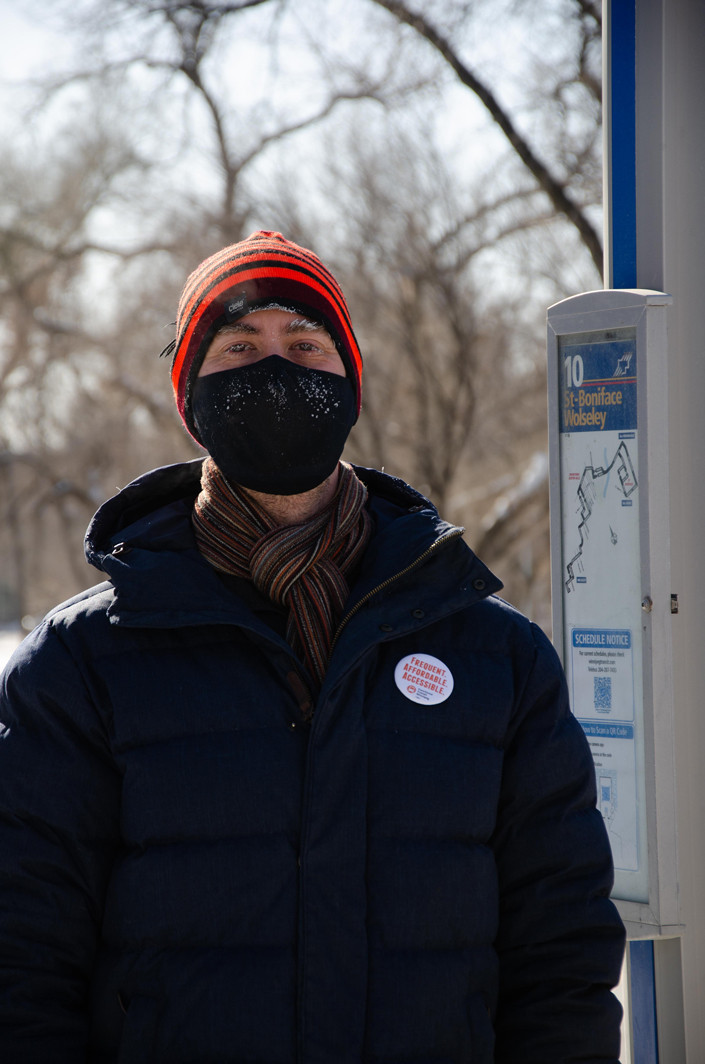Fare-free transit motion scrapped from City agenda
Transit advocates stress the need for affordable transit

Kyle Owens, vice-president of Functional Transit Winnipeg, says reducing the cost of transit is key to making the city more equitable and traversable. Photo by Keeley Braunstein-Black
The fight for affordable, accessible public transit in Winnipeg continues despite a recent decision in a Standing Policy Committee on Infrastructure Renewal and Public Works meeting.
At a Lord Selkirk-West Kildonan Community Committee meeting on Feb. 2, Coun. Vivian Santos forwarded a motion to develop a report on fare-free public transit in hopes of creating a tangible data model for all levels of government to reference. The motion was defeated in the committee meeting after a tie vote.
In an interview with The Uniter, Santos said access to transportation is an ongoing concern in her Point Douglas constituency. Ever since she became a city councillor in 2018, Santos said she’s had numerous discussions with other council members, nonprofits and stakeholders who have emphasized the need for affordable transit.
“My office would always get requests or grant requests to purchase tickets or donations of bus passes,” Santos said.
The City’s current measures to make transit more affordable and accessible include the WINNpass (a reduced-fare bus pass for low-income residents), as well as waiving fares for children under 11 accompanying a fare-paying rider.
Transit advocates from groups like Functional Transit Winnipeg (FTW) and union representatives from the Amalgamated Transit Union Local 1505 (ATU 1505) have spoken in favour of implementing fare-free transit in Winnipeg.
COVID-19 has impacted everyone to varying degrees. Kyle Owens, the vice president of FTW, sees reducing the cost of transit as both an immediate benefit to those who are most economically vulnerable and a way to increase cross-city mobility.
“Barriers to transportation through the city mean that you are blocked from accessing city services, healthcare, employment, shopping, groceries. That friction reduces the ability to live your life,” Owens says. “By having robust, functional, accessible, affordable transit, those barriers are removed.”
He adds that FTW not only advocates for fare-free transit but also decreased bus wait times through more frequent service.
Romeo Ignacio, president of the ATU 1505, spoke at the committee meeting where the bill was struck down. He says eliminating fares would not only make transit more affordable and accessible, but also improve rider and driver safety.
“Most of the incidents on our buses stem from either fare disputes or something that has to do with fares,” Ignacio says.
With the federal government unveiling the Zero Emission Vehicle Incentive Program, Ignacio believes fare-free transit and a move toward implementing zero-emission buses in Winnipeg could work in tandem. While he understands that implementing free or reduced-fare transit is a big step, he believes it will ultimately benefit Winnipeggers.
“If we maintain this fare structure, it’s just going to be another hindrance for people that rely on the service,” he says. “They will have to choose between transportation and food or health.”
Owens, on the other hand, believes ambitious investment in public transportation would help accelerate Winnipeg’s economic recovery, making the transition to a revitalized city happen faster.
Despite her motion being struck down, Santos said the economic impact of COVID-19 makes the need for fare-free transit all the more pressing.
“I believe that everyone will benefit from it. It’s all about mobility,” she said.
Published in Volume 75, Number 19 of The Uniter (February 25, 2021)







